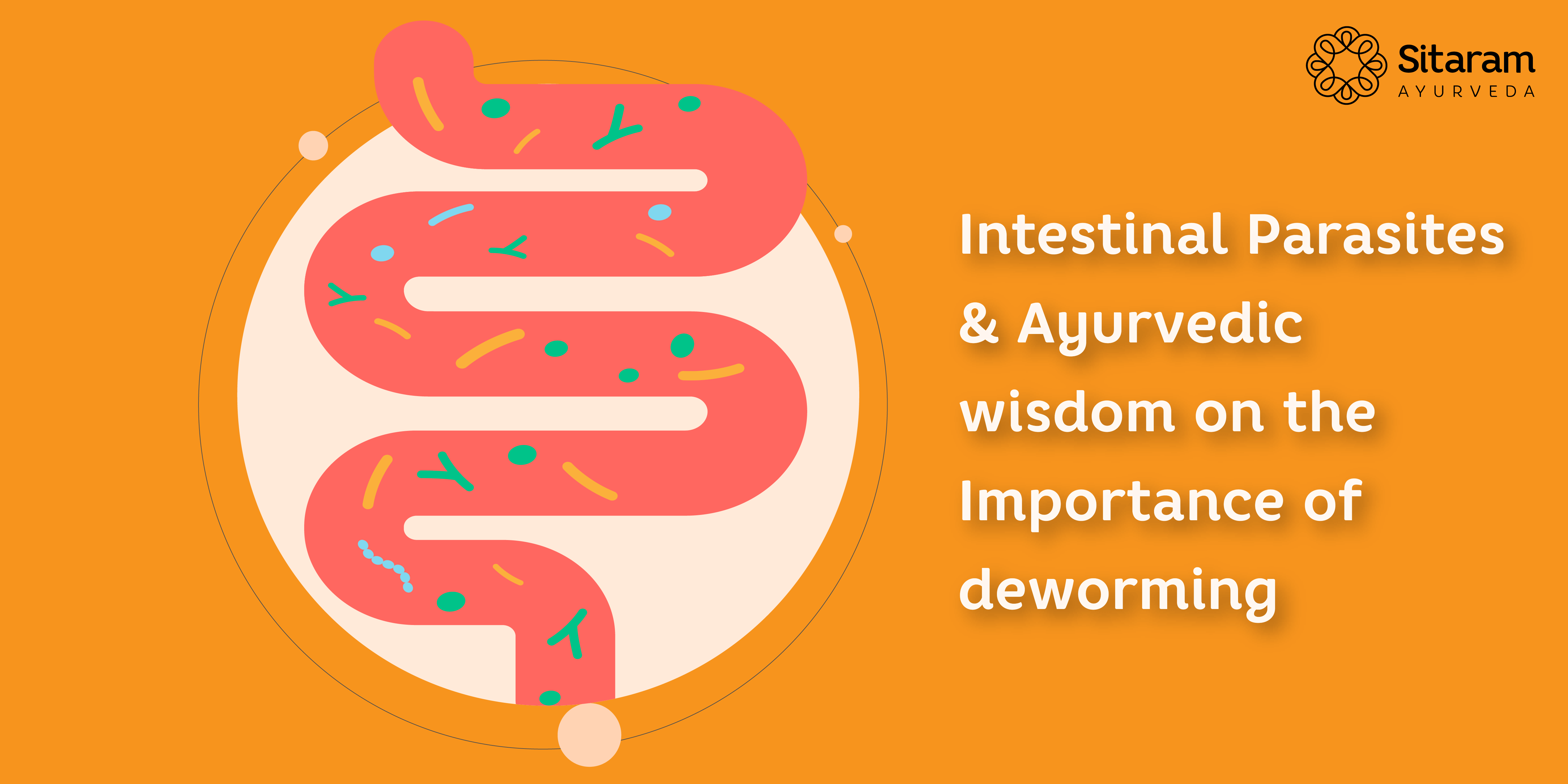Intestinal Parasites & Ayurvedic Wisdom on the Importance of Deworming

Intestinal worms or helminths are more common than we think. Around 3.5 billion helminth infections are reported every year, including in the developed regions of Europe and America. The issue is more prevalent in the tropics, developing nations, and economically backward regions of the world. Also, children are more susceptible to intestinal worms because of their exposure to soil and close mingling with each other.
Realizing the far-reaching health effects of worm infestation, India has been observing the 10th of February as national deworming day, supplying anti-parasitic medications in nurseries and schools.
What are Intestinal Worms?
Intestinal worms or helminths are parasitic worms that can live inside our bodies. While some of those can be too small to be seen by the naked eye, others are as large as half a meter to one meter. Most of them live in our intestines, but some may also live inside our liver, lungs, muscle, urinary tract, or even brain and cause serious health issues. Different types of worms are there, namely roundworms (nematodes), tapeworms (cestodes), flatworms (trematodes), and acanthocephala (thorn-headed).
How do we get intestinal worms?
Helminths mostly get into our bodies through the soil. The eggs of worms may be present in the soil which is contaminated by stool (poop) of animals or humans. This can get under the nails when we come into contact with the soil and enter the body while having food. Worms may also get into the body if we drink unclean water. Undercooked meat can also be a reason for worm infestation because some worms lay eggs inside the liver or muscles of cattle, pigs, and certain shrimps.
Do adults get infested with helminths too?
Though children are more susceptible because of their loose attitude to hygiene and frequent contact with soil while playing, anyone can get intestinal worms.
The ways adults get intestinal worms are:
● Eating undercooked pork or beef.
● Farming or gardening activities.
● Swimming in unclean water or drinking unclean water.
● From other family members, especially children through food or clothes
Why are intestinal worms bad?
Helminths are parasites that feed off the food we eat. This can cause different issues of malnutrition like anemia, fatigue, poor growth, or learning difficulties in children. Sometimes, worm infestation can become too bad and may block the passage of food through our intestines. Even milder worm infestations can cause inflammations and allergic reactions due to the immune response of the body against the parasites.
How can we know if we have worms inside our gut?
Mild worm infestations can exist without any symptoms.
● Sometimes gastric symptoms like stomach pain, nausea, abdominal bloating and distension, lack of appetite, etc can be observed in some.
● Nutritional issues like anemia, tiredness, vitamin deficiency, reduced growth in children etc despite eating good food can be a result of parasites.
● Allergic reactions and hypersensitivity is other possible symptom of helminthiasis.
● Chronic inflammation can be caused as a response to parasites, which in turn can lead to lower immunity, tiredness, joint issues, etc.
What does ayurveda say about intestinal worms?
Ayurveda had identified and described helminths and other parasites as ‘Krumi’ centuries ago. The text urges to rule out the possibility of parasitic infestation if certain inflammatory conditions and hypersensitivities do not respond to direct treatment. As a science that originated in an era when parasites were possibly more common, Ayurveda has identified and described herbs that are very effective in getting rid of helminths.
According to Ayurveda, removing parasites is important in maintaining health and preventing diseases.
Helmolyte A syrup:
(Get a good description from the factory too)
- Helmolite A contains medicines which can help to kill intestinal parasites as well as improve the digestion in a natural way.
- The syrup form makes it more palatable for children and convenient to administer.
- The unique combination also restores normal bowel movements and improves nutrient absorption. This way it helps to reverse the effects of helminthiasis like anaemia, malnutrition, fatigue etc.
- Destroys intestinal parasites.
- Improves digestion and absorption.
- Restores appetite.
- Contains extracts of herbs like neem, pomegranate, triphala which contain natural anti helminthic alkaloids as well as compounds which regulate digestive function


 Sign In
Sign In Cart
Cart